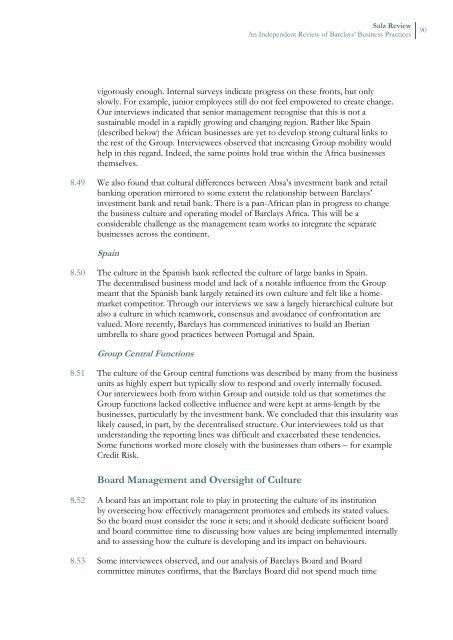Salz Review - Wall Street Journal
Salz Review - Wall Street Journal
Salz Review - Wall Street Journal
Create successful ePaper yourself
Turn your PDF publications into a flip-book with our unique Google optimized e-Paper software.
<strong>Salz</strong> <strong>Review</strong><br />
An Independent <strong>Review</strong> of Barclays’ Business Practices<br />
90<br />
vigorously enough. Internal surveys indicate progress on these fronts, but only<br />
slowly. For example, junior employees still do not feel empowered to create change.<br />
Our interviews indicated that senior management recognise that this is not a<br />
sustainable model in a rapidly growing and changing region. Rather like Spain<br />
(described below) the African businesses are yet to develop strong cultural links to<br />
the rest of the Group. Interviewees observed that increasing Group mobility would<br />
help in this regard. Indeed, the same points hold true within the Africa businesses<br />
themselves.<br />
8.49 We also found that cultural differences between Absa’s investment bank and retail<br />
banking operation mirrored to some extent the relationship between Barclays’<br />
investment bank and retail bank. There is a pan-African plan in progress to change<br />
the business culture and operating model of Barclays Africa. This will be a<br />
considerable challenge as the management team works to integrate the separate<br />
businesses across the continent.<br />
Spain<br />
8.50 The culture in the Spanish bank reflected the culture of large banks in Spain.<br />
The decentralised business model and lack of a notable influence from the Group<br />
meant that the Spanish bank largely retained its own culture and felt like a homemarket<br />
competitor. Through our interviews we saw a largely hierarchical culture but<br />
also a culture in which teamwork, consensus and avoidance of confrontation are<br />
valued. More recently, Barclays has commenced initiatives to build an Iberian<br />
umbrella to share good practices between Portugal and Spain.<br />
Group Central Functions<br />
8.51 The culture of the Group central functions was described by many from the business<br />
units as highly expert but typically slow to respond and overly internally focused.<br />
Our interviewees both from within Group and outside told us that sometimes the<br />
Group functions lacked collective influence and were kept at arms-length by the<br />
businesses, particularly by the investment bank. We concluded that this insularity was<br />
likely caused, in part, by the decentralised structure. Our interviewees told us that<br />
understanding the reporting lines was difficult and exacerbated these tendencies.<br />
Some functions worked more closely with the businesses than others – for example<br />
Credit Risk.<br />
Board Management and Oversight of Culture<br />
8.52 A board has an important role to play in protecting the culture of its institution<br />
by overseeing how effectively management promotes and embeds its stated values.<br />
So the board must consider the tone it sets; and it should dedicate sufficient board<br />
and board committee time to discussing how values are being implemented internally<br />
and to assessing how the culture is developing and its impact on behaviours.<br />
8.53 Some interviewees observed, and our analysis of Barclays Board and Board<br />
committee minutes confirms, that the Barclays Board did not spend much time
















